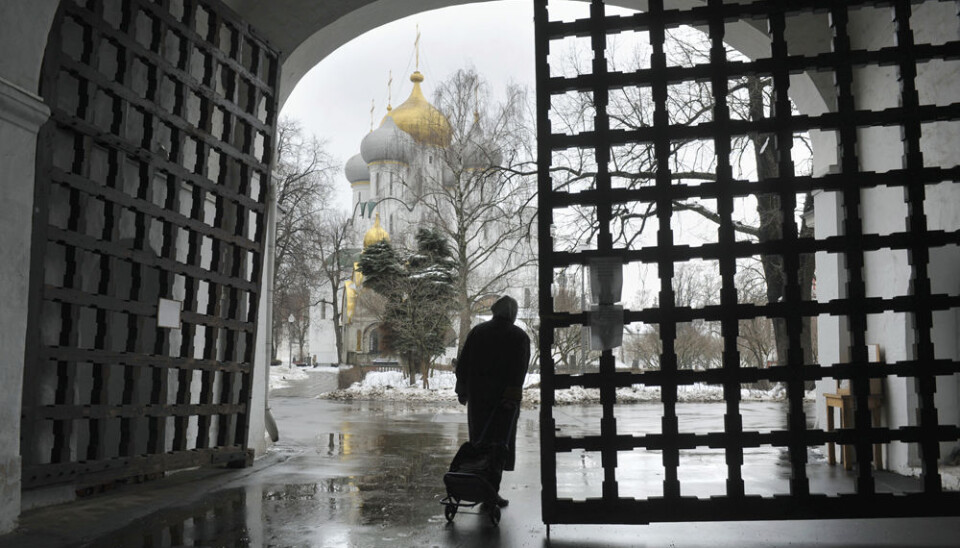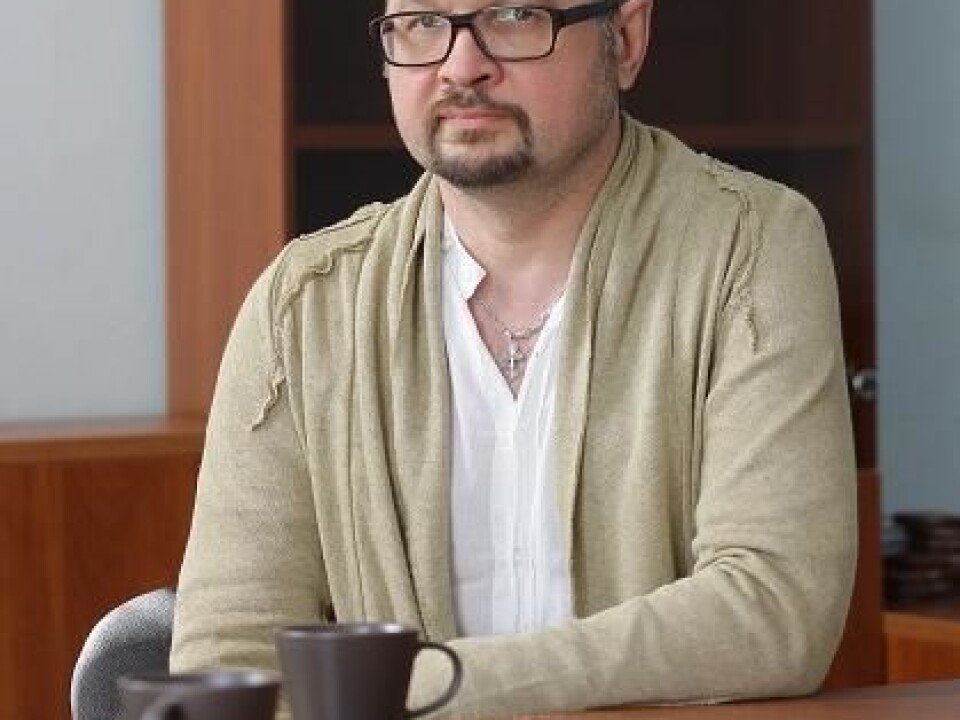This article was produced and financed by Diku - The Norwegian Agency for International Cooperation and Quality Enhancement in Higher Education

Russia: The Unhappy People
It has been said that it is hard for a foreigner to capture the Russian soul. The Russian melancholy is a collective feeling of loss and heavy burdens.
Denne artikkelen er over ti år gammel og kan inneholde utdatert informasjon.
The Russian sense of melancholy is not personal, but rather a social mood, a feeling of loss and a strong collective sense of being the people who carries the cross, through revolutions and upheavals, on behalf of the world.
In literature this has been cultivated as a central motif, especially by the symbolists in the early 20th century, but even in contemporary literature one may find traces of this kind of ideas. If you have ever attended a get-together with Russians, while sipping a glass of vodka, you probably got acquainted with some of this melancholy, the wistfulness of the late-night singing, the talk about the past or the reluctance to talk about the past.
But is this not merely a cliché, a construction of Russianness? Are Russians really such a sore and unhappy people? Is it intentional? Do they actually want to come across as enigmatic?
The Russian researcher Eduard Ponarin and the Finnish researcher Kimmo Kaariainen have both explored factors that might explain this perceived unhappiness.

The ex-Communist paradox
Since 1981 the World Values Survey (WVS) has collected data from more than ninety nations throughout the world as part of measuring levels of happiness and subjective wellbeing. The WVS shows that there is a strong correlation between a nation’s economic state (GDP) and the way people feel about themselves.
One essential finding in the WVS is that the move from being a low-income society to a higher-income society has made people crave more secular-rational values and given them a desire for self-expression. In other words: as a society gets materially richer, more people get secularised (they discard traditional values and quit religion) and start to value and cultivate the freedom of expression and choice.
This rings true all over the world, with one major exception: the ex-communist societies, including Russia. In fact, the survey shows almost the opposite development in Russia: people turned to religion en masse after the Soviet collapse when the economy plunged. But what is different from other nations is that people still tend to turn to religion even though Russia is now climbing on the GDP index. Why?
Number 83 on Quality of Life list
Russia is ranked as number 83 on the Quality of Life Index 2011. At the bottom, in 137th place, we find Somalia, while Iceland tops the list.
The index indicators include health, education, wealth and democracy. According to the 2010 CIA World Factbook’s country comparison of GDP per capita, Russia is number 71 (out of 228). This places Russia ahead of most of the Latin-American countries.
However, according to the WVS, despite the fact that Russians are wealthier than Latin Americans, the latter are, paradoxically, far happier. It turns out there is one major difference between the two apart from the economy: more Latin Americans believe in a god.
Forced atheism
In Religion in Russia after the Collapse of Communism the Finnish researcher Kimmo Kaariainen concludes that as a result of a more open religious policy following the collapse of the Soviet Union, the number of believers in Russia has been increasing. At the same time his findings show that as Russians age, they tend to become more religious and also that many people who suffered under the Soviet atheist policies are now turning to religion again. If the logic from Latin America is applicable to Russia, a growth in the number of religious people should point in the direction of more happiness.
Even though about three quarters of the Russian population identifies with the national religion, which is Russian Orthodoxy, less than ten per cent actually practices religion, according to Dr. Edurad Ponarin. This is confirmed by data from many different sources over the past ten years
Ponarin is a Russian sociology researcher at The Higher School of Economics (HSE) in St. Petersburg and the head of the Laboratory of Comparative Social Studies (LCSS) at. His recent research projects have been focusing on freedom of speech in the post-Soviet press and on religious and ethnic identity in Russia.
“The fact that older people are more religious is not a unique feature of Russia; it is a universal phenomenon. Russia is special, however, in that its GDP per capita does not pay off in terms of happiness," says Ponarin.
"Russians are underachievers unlike many Latin American countries that overachieve in terms of happiness per unit of wealth. In other words, it takes more roubles in Russia to reach the same level of happiness as in Latin American countries,” Ponarin explains.
Parallel worlds
During the Soviet era, and probably in all oppressive regimes, there was a culture of parallelism. Even though the official policy was state atheism and the state imposed strict censorship, there existed an unofficial culture where one could read, listen to and write about illegal subjects. The parallel culture was infiltrating society on many levels and transcended both cultural and political censorship.
State control has its limits, and one’s personal, inner thoughts about the great mysteries of life are for no one to control. This poses a new question: could it be that the Russians used to be as religious back then as they are now, the only difference being that it is now ok to be open about it?
“The source of Russian unhappiness has perhaps less to do with religion than with the country's recent history and its political system. Happiness has been shown to be related to freedom of choice and to a sense of control people think they have over their lives. Russia's scores are low on this variable,” says Ponarin.
Lack of freedom
It seems clear that religion and economy alone cannot explain Russian unhappiness. One has to take into consideration that freedom is a key factor for happiness.
In Soviet times people largely lived under the same conditions for almost 80 years. All of a sudden, after 1991, this changed rapidly, and the huge gap between rich and poor polarised society and made a mockery of unprivileged people’s sense of justice and fairness. Even though Russia is climbing on the GDP rankings year by year and the middle class is growing, as much as half of the population still struggles to make ends meet.
“Russians have recent experience of a total systemic collapse. Whereas Hungarians or sometimes even Ukrainians could point their finger at Russians and absolve themselves of responsibility for the 'Russian system', Russians find it harder to escape responsibility for the national failure. Having little freedom is probably more depressing for the upper social strata, as wounded national pride is more depressing for the lower social strata,” says Ponarin.
That said, Ponarin also points out that people in Russia have actually been getting a little happier in the past ten years, a fact explained by rising living standards, not by religion.
Civil society and trust
Tolerance and civil society are two intertwined and important factors that feed people’s feeling of security and subsequently their wellbeing.
Professor Robert Putnam's recent research on social capital in the US shows that half of all social connections are religious. He also claims that religious people are nicer people, no matter which religion. What about Russian civil society – could religion play an active role in Russia?
“Religious Russians may be divided into two major groups. The first and larger one is similar to the bulk of the population in underdeveloped countries: they are superstitious, envious, greedy, suspicious and often aggressive. The second group, typically better educated urban dwellers, are indeed nicer people. However, because the general level of trust in Russia is not very high and because this group constitutes a small minority, they cannot significantly influence social networks,” Ponarin continues.
A nationalist tendency
For several years we have been witnessing an increasing tendency towards a more xenophobic society in Russia, with growing nationalist movements and an increasing number of incidents of clearly racially motivated violence and even killings.
Ponarin explains that tolerance is related to the level of development as measured, for instance, by the Human Development Index. The social catastrophe that occurred in Russia in the wake of the Soviet collapse substantially reduced living standards, increased the level of insecurity, and left an ideological vacuum that is being filled with a nationalist alternative.
“There are not too many ideologies to choose from. Socialism would not work as it had just failed with the USSR. Liberalism was tried in the 1990s and failed as well. Nationalism comes naturally in such circumstances,” Ponarin says, adding that the Russian Church has a long history of being a department of state. If most Russians were active members, then the church might actually contribute to authoritarianism. But as an institution that is one among many others, the Russian Church may indeed contribute to the process of democratisation.
In a way it seems that everything is reversed in Russia. Maybe Russia will always remain an enigma after all?






























